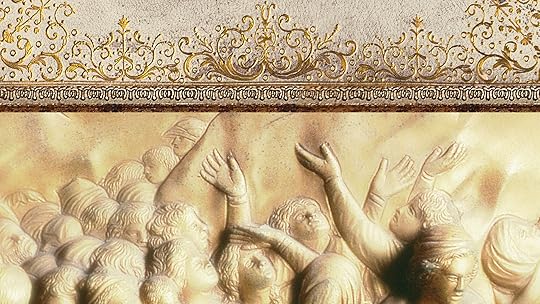R.C. Sproul's Blog, page 54
October 6, 2020
Stream the Luther Documentary for Free

More than five hundred years ago, Martin Luther nailed his Ninety-Five Theses to the Castle Church door in Wittenberg. Little did he know how the Lord would use him to ignite a movement that would change the world.
For a limited time, you can stream Luther: The Life and Legacy of the German Reformer for free on Ligonier’s YouTube channel. Celebrate Reformation Week by remembering the events God used in Luther’s life that led him to rediscover the gospel of justification by grace alone, through faith alone, in Christ alone. Tell your friends about this film or watch it together.
To dig even deeper into Luther’s story and significance, you can also download Ligonier’s free accompanying study guide.
“With a holy boldness, Martin Luther took his stand contra mundum, against the world.” —R.C. Sproul


The Covenantal Hermeneutic
Here’s an excerpt from The Covenantal Hermeneutic, Keith Mathison's contribution to the October issue of Tabletalk:
Is the Sermon on the Mount directly applicable to Christians today? Is the Sabbath commandment still in effect? Should Christians baptize their infants? How we answer these and many other questions depends on the interpretive assumptions we have before we even open the Bible. We all come to the Bible with certain ideas about how it should be read, but herein lies the problem. If we bring these assumptionstoScripture, where did we get them in the first place? Are we deriving our assumptions from Scripture or bringing them in from the outside?
Continue reading The Covenantal Hermeneutic, or begin receiving Tabletalk magazine by signing up for a free 3-month trial.
For a limited time, the new TabletalkMagazine.com allows everyone to browse and read the growing library of back issues, including this month’s issue.


October 5, 2020
One Week Only: Save Up to 50% on Study Bibles

This week only, save when you order select editions and cover styles of the Reformation Study Bible. Edited by Dr. R.C. Sproul and drawing from the wisdom of 75 distinguished theologians, the Reformation Study Bible elevates Scripture on every page by providing comprehensive and trustworthy commentary, made accessible to all readers. Order today and receive 50% off. This special sale includes many different cover styles, such as light gray leather-like, crimson hardcover, and black Seville cowhide.
The Condensed Edition features the best of this commentary in a conveniently portable format. This popular edition is suitable for travel, public worship, and life on the go. Order today and receive 35% off. It is available in several attractive cover styles, including the black premium leather gift edition.
SHOP NOW
Did you know that we recently released our Spanish edition of the Reformation Study Bible, La Biblia de Estudio de La Reforma? Order a copy today and get this storehouse of faithful biblical commentary, entirely in Spanish, for a lifetime of enriching study.


What Does It Mean That Baptism Is for the Forgiveness of Sins (Acts 2:38)?

Does baptism cause our sins to be forgiven? From one of our live events, R.C. Sproul and Derek Thomas help us understand the meaning of Acts 2:38.
To ask a biblical or theological question, just visit ask.Ligonier.org or message us on Facebook or Twitter.
Read the Transcript


How Can God Bring Good Out of Evil?

People tend to feel uncomfortable when reading that God from all eternity, immutably and freely, ordains whatsoever comes to pass. This means, after all, that everything that happens in this world, including the evil things that others do to us and, astonishingly enough, our own sins against others, is immutably foreordained by almighty God. If we have been eternally ordained to commit sin, why does God find fault? We may as well sin with abandon, knowing that we are being directed by the providence of God. This is the mystery of providence. Doing no violence to the will of His creatures, God achieves His purposes through His chosen means.
One view has it that, as we hurtle through space, centrifugal force, gravity, and centripetal force keep us from collapsing and falling out of existence . These forces and powers are real . Gravity exists, but its power is not inherent . Even the power of gravity rests on the primary power of God . Gravity is not an independent primary cause . The only primary cause is the one by whom all things are made and in whom all things hold together . Ultimately, what keeps us from falling off the edge of the earth is the hand of God . But He exercises His power through the real power of secondary causes, such as gravity.
In terms of human relationships, we are secondary causes, and the powers we exert are real, not illusory . We are not puppets with no volition, freedom, or power, but we have no volition, freedom, or power beyond that given to us by God. He remains sovereign over all these things, bringing His sovereign will to pass.
When discussing God’s decrees, we speak of the concurrence of the human and divine wills. Concurrence is also called confluence. Both words mean “a flowing together.”
A biblical example of concurrence is the story of Joseph. After enduring unspeakable suffering and injustice at the hand of his brothers, Joseph wound up in solitary confinement in a foreign land. After a time, he was released from prison and elevated to the office of prime minister in the world’s most powerful empire, Egypt. Then famine came, and Joseph’s father, Jacob, sent his sons to Egypt to appeal for food. The brothers encountered Joseph but did not recognize him until he revealed his identity. Because they had mistreated him and they knew that Joseph had the power to take revenge on them, they were terrified and confessed their sins. Joseph said about their actions, “You meant evil against me, but God meant it for good” (Gen. 50:20).
In this drama, there is a concurrence between God’s intention and men’s intention. One intention is motivated by pure holiness, the other by sheer wickedness. Joseph’s brothers meant his suffering for evil, and insofar as this was their motivation, they were culpable before God. But God had ordained that through the brothers’ choices, He would bring Joseph to Egypt. Working above and through secondary causes, God would save the people of Israel. God used the work of Joseph’s brothers for redemptive purposes. That does not, however, excuse the brothers. Through the great mystery of providence, the transcendent Governor of all things brings good out of evil. Instead of overruling the wicked desires of Joseph’s brothers, God transcended them and by His power brought good out of evil.
How can God bring good out of evil? That great mystery is the most comforting promise in the New Testament: “For those who love God all things work together for good, for those who are called according to his purpose” (Rom. 8:28). This does not mean that everything that happens is good in and of itself; but due to providence everything that happens is working toward our good. Without the concept of providence, we would miss the comfort, consolation, and joy of knowing that God stands above and beyond all things. He is not an isolated spectator who roots for us. A common view in the evangelical world today is that God is powerless to stop all these bad things: He is standing on the sidelines, hoping that the ball bounces the right way so that His eternal purposes are not thwarted. But His purposes cannot be thwarted, because He will work through even bad bounces to bring about victory.
God does not direct injustice toward His people. In fact, every tragedy becomes a blessing. There are no ultimate blessings for unbelievers, however, because every blessing they receive for which they remain ungrateful only redounds to their greater guilt. In the final judgment, every blessing unbelievers have received at the hands of a benevolent God becomes the foundation of their curse. So for believers, there are no tragedies, and for unbelievers, there are ultimately no blessings.
This excerpt is adapted from Truths We Confess by R.C. Sproul. In Truths We Confess, now thoroughly revised and available in a single, accessible volume, Dr. Sproul introduces readers to this remarkable confession, explaining its insights and applying them to modern life. Order the hardcover book today.


October 4, 2020
Will You Pray for Awakening? Download Your Free Prayer Guide

We live in a world that needs awakening. Millions of people do not know Jesus Christ. The church itself needs renewed zeal for the truth, for spiritual growth, and for missions. Scripture reveals how this awakening comes about: by a powerful movement of the Spirit of God. It also tells us that when just two men—Paul and Silas—prayed, the earth itself shook (Acts 16:25–26). So we are dedicating the entire year of 2020 to pray for awakening, and we hope you will, too.
To help as many people as possible, we produced this free prayer guide. Download it today at PrayForAwakening.com, find it in the PrayerMate app, or order the prayer booklet in packs of ten to share with your loved ones.
To use the guide, find the prayer that corresponds to the current week. Each week of the month focuses on a different group to pray for, starting with you and your family and expanding to the world and the global church. You can also share your desire to #PrayForAwakening on social media.
OCTOBER PRAYER FOCUS:
Week 1: Pray that you and your family will offer yourselves to God as living sacrifices, wholly committed to His will. “I appeal to you therefore, brothers, by the mercies of God, to present your bodies as a living sacrifice, holy and acceptable to God, which is your spiritual worship.” (Rom. 12:1)
Week 2: Pray that you will be willing to speak God’s Word to the people in your life and that God will supply opportunities to do so. “You shall teach [God’s commandments] diligently to your children, and shall talk of them when you sit in your house, and when you walk by the way, and when you lie down, and when you rise.” (Deut. 6:7)
Week 3: Pray that God will bring the leaders of your city and your nation to faith in Christ.
Week 4: Pray that the church around the world, especially in countries where it is severely persecuted, will faithfully declare the glory and works of God. “Sing to the LORD, all the earth! Tell of his salvation from day to day. Declare his glory among the nations, his marvelous works among all the peoples!” (1 Chron. 16:23–24)
We hope this prayer guide encourages you this year and in future years. Join us in praying fervently for a mighty movement of God’s Spirit today, thankful that He has graciously promised to hear us, and confident that He will answer our prayers according to His will.
DOWNLOAD NOW


October 3, 2020
Always Ready Live: October 3, 2020

How you answer the tough questions makes all the difference in the world. What will you say when your friends ask about your faith? Do you have the confidence to defend the hope you have in Christ?
On October 3, 2020, Ligonier Ministries and RBC hosted Always Ready, an online livestream for young students. Eric Bancroft, Nathan W. Bingham, Joel Kim, Stephen Nichols, and Burk Parsons helped equip Christians aged 12–18 to share their faith and stand firm for the truth of God’s Word.
This special online event was streamed live on our blog, as well as on YouTube, Facebook, and Twitter. You can also watch a recording of the event below.
Watch The Recording
Is the Bible still relevant? Since God is good, why do we suffer? Is Jesus the only way to salvation? Eric Bancroft, Nathan W. Bingham, Joel Kim, Stephen Nichols, and Burk Parsons will help equip you to better answer these important questions and more. This livestream has been designed for Christian students, but everyone is welcome. Make sure you tell your friends about this online event.
.jpg)
Our Speakers:
Rev. Eric Bancroft is pastor of Grace Church in Miami. Previously he served as senior pastor of Castleview Church in Indianapolis and as a fellow at The Mathena Center for Church Revitalization at The Southern Baptist Theological Seminary in Louisville, Ky.
Nathan W. Bingham is director of communications for Ligonier Ministries and a graduate of Presbyterian Theological College in Melbourne, Australia. He blogs at NWBingham.com.
Rev. Joel Kim is president and assistant professor of New Testament at Westminster Seminary California in Escondido, Calif. He is a teaching elder in the Presbyterian Church in America and has served as a pastor in several churches in Michigan and Southern California. He is coeditor of Always Reformed. Rev. Kim is also a Ph.D. candidate at Calvin Theological Seminary in Grand Rapids, Mich.
Dr. Stephen Nichols is president of Reformation Bible College, chief academic officer for Ligonier Ministries, and a Ligonier Ministries teaching fellow. He is author of numerous books, including For Us and for Our Salvation and A Time for Confidence .
Dr. Burk Parsons is senior pastor of Saint Andrew’s Chapel in Sanford, Fla., chief publishing officer for Ligonier Ministries, editor of Tabletalk magazine, and a Ligonier teaching fellow. He is editor of Assured by God: Living in the Fullness of God’s Grace .
Livestream Sessions:
Why Apologetics? by Nathan W. Bingham
Is Christ Really the Only Way? by Stephen Nichols
How Can a Loving God Allow Evil? by Burk Parsons
Is the Bible Still Relevant? by Joel Kim
What Is Truth? by Eric Bancroft
Questions & Answers


“My Soul Magnifies the Lord”

Why are so many songs recorded at the beginning of the gospel of Luke? R.C. Sproul outlines the significance of Mary’s “Magnificat” and other songs that appear in Scripture.
Transcript:
Now, one of the most important features of the gospel of Luke is that Luke does contain some interesting observations about the infancy of Jesus. Luke tells us at the beginning of his gospel that he undertook a program of research by seeking out the eyewitnesses, and tradition has it that he interviewed Mary and learned much of the early years of Jesus from Jesus’ mother. That’s why Mary figures so prominently in the birth narratives of the gospel according to Luke. But the other aspect of these infancy narratives that I find particularly fascinating is the inclusion of songs. We have the song of Zacharias, which is called the Benedictus. We have the song of Mary, which is called the Magnificat. We have the song, for example, of Simeon, which has been called the Nunc Dimittis. The titles of these songs derive from the first words of the songs as they appeared in the old Vulgate version of the Bible, the Latin version of the Bible.
For example, the Magnificat begins, “My soul doth magnify the Lord,” and when that goes over into Latin, that’s where you get that term. But there is a significance to this. If we remember the Old Testament history, there are those moments, particularly in the early days of Israel’s history, where we also encounter some magnificent songs. There’s the song of Moses that celebrates the Exodus and the song of Miriam. There’s the song of Deborah in the book of Judges. And the reason why these songs are important is that in the Old Testament period, when God visited His people to bring them an extremely important moment of deliverance or of redemption, it was customary for the people to record this visitation of God’s mercy by composing a song that would then celebrate it. And we see no place in Scripture where there is a greater concentration of such victory songs or deliverance songs as we find recorded in Luke’s gospel that surround the supreme visitation of God, by which He visits His people in the person of His own Son.
It’s interesting to me, too, that in the book of Revelation—and we look in terms of the future of God’s people—the promise is given that, on that day, God will give His people a new song. And again, the significance of that is that that song will celebrate the ultimate victory of God and His ultimate act of deliverance.


Are People Good by Nature? 46% of “Evangelicals” Think So.

Unless we understand the depth of our sin, we likely won’t recognize our need for God’s saving grace. Sadly, the results from our 2020 State of Theology survey uncovers widespread confusion among Christians in America about the reality and effects of sin. Conducted in partnership with Lifeway Research, the full results of this survey are now available.
According to our recent findings, 46 percent of professing U.S. evangelicals* agree with the following statement: “Everyone sins a little, but most people are good by nature.” This idea cannot be reconciled with the emphatic teaching of Scripture that all people are radically corrupted sinners in need of salvation (Rom. 3:23). Even the smallest sin is high treason against our Creator, leaving us hopeless of escaping His judgment apart from His mercy in Christ.
Ligonier Teaching Fellow Dr. Stephen Nichols recently spoke on the significance of this finding in the State of Theology survey.
When Christians take sin lightly, our gospel witness is jeopardized. In a rapidly changing culture, the church must remain steadfast in proclaiming the message of salvation in Jesus Christ for ruined sinners. We hope these survey results will encourage American Christians to defend the gospel boldly to the praise of God’s glorious grace.
* Evangelicals were defined by this survey as people who strongly agreed with the following four statements:
The Bible is the highest authority for what I believe.
It is very important for me personally to encourage non-Christians to trust Jesus Christ as their Savior.
Jesus Christ’s death on the cross is the only sacrifice that could remove the penalty of my sin.
Only those who trust in Jesus Christ alone as their Savior receive God’s free gift of eternal salvation.


October 2, 2020
If We Do Not Witness and Share the Gospel Will Some People Not Go to Heaven?

Our evangelism should be motivated not by a fear that some of God’s people may be lost, but by an absolute confidence that all whom He has chosen will come to Christ. From one of our Ask R.C. events, R.C. Sproul speaks on God’s sovereignty and our witness.
Just ask Ligonier to get clear and trustworthy answers to your biblical and theological questions.
READ TRANSCRIPT


R.C. Sproul's Blog
- R.C. Sproul's profile
- 1931 followers




